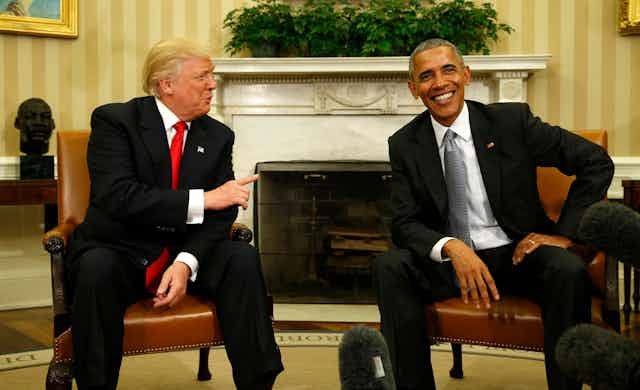The United States that emerged as the “last man standing” and the bedrock of liberty at the end of the Cold War initially had its moral standing seriously questioned during George W. Bush’s presidency.
It started with the restrictions of civil liberties as part of the Global War on Terror and the 2003 Iraq War, which circumvented the United Nations’ authorisation. Anti-Americanism was rampant all over the world, and the global public opinion of the Bush administration was scathing, particularly on foreign policy.
Then came 2008 US presidential election, which delivered assurance and brought back faith in the US leadership. Barack Obama vowed to mend ties, reset relations and re-engage in multilateralism. Mainly on this promise, and with less than a full year in office, Obama won the Nobel Peace Prize in 2009. While many now debate whether it was deserved (even the president himself joked about it), the award signalled the immense symbolic power of the US presidency, and confirmed that the decisions American voters make reverberate far beyond their country.
From the perspective of November 8, 2016, the Obama years now begin to look more like an aberration. It is clear that Donald Trump’s victory hits additional nails in the coffin of US soft power.
The concept is somewhat elusive. Soft power has usually been defined as the power of attraction and persuasion. Among other things, it hinges on a country’s culture, values and ideals. It is the ability to get others on board not because you are strong, but because you are good. In this vein, the liberal democratic values at home fuel US soft power abroad.
While there are certainly a number of issues within the US polity and society that leave freedom and equality out of reach for some, there has never been a departure from those ideals and a commitment to rectify present concerns.
This presidential election has awoken a streak of authoritarianism in the US that is incompatible with its soft power. There is the growing intolerance towards “others”, be they Mexicans, Muslims, African-Americans or the LGBTQI community. There’s also been a strong emphasis on law and order – which is also a thinly veiled code word aimed against minorities. These developments empower and legitimise those with similar inclinations around the globe. It is no surprise that Trump received the strongest congratulatory messages from the likes of Vladimir Putin, Nigel Farage, Marine Le Pen, Geert Wilders and Pauline Hanson. Their common denominator is illiberalism and a lack of trust in international cooperation.
With the exception of autocratic leaders and those who are seriously veering away from democratic norms, most democratic elites find him unappealing at best and downright frightening at worst. What does this mean for international affairs? Obama’s two terms have largely depended on smart power – the right balance of hard and soft power that has worked towards resolving major global issues, saving blood and treasure, and encouraging burden sharing.
As the United States grows more illiberal at home and obsessed with pursuing only its own national interest, and as its shuns international institutions and potentially turns away from long standing friends and allies, it sends a powerful message to other states that they can follow suit. Seeing the outcome of the US presidential race, it is easy to imagine the current wave of nationalist populism gaining further strength in Europe and elsewhere.
Moreover, it is ironic that Trump’s first and third wives hail from former communist states. For many of their compatriots, the United States’ allure lay primarily in its liberty; it was a country so starkly different from their own.
Public opinion of the US in foreign countries affects US foreign policy. Of all the G20 countries, only Russian public expressed a preference for a Trump presidency. This might be a good indicator of the years to come.
Clearly, the country is more than just its president-elect. The United States is a sum of all its people, the majority of whom, paradoxically, voted for Hillary Clinton. But at the same time, an overwhelming majority of Americans have time and again expressed that they wanted change. That change is now here, in the form of strongman rejecting many of the core values and attitudes that have been synonymous with the US.
It remains to be seen how many of the campaign promises Trump delivers on. But it is hard to see how the global image of America that Obama worked so hard to build will be maintained after Inauguration Day on January 20.

